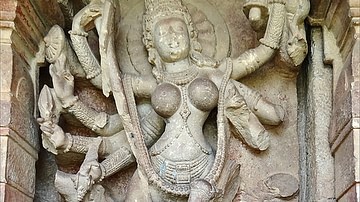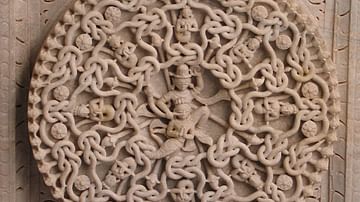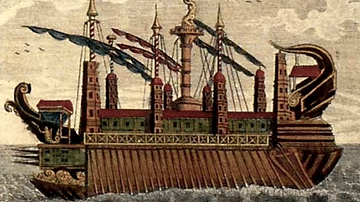Search Definitions
Browse Content (p. 239)

Definition
Plautus
Titus Maccius Plautus, better known simply as Plautus (actually a nickname meaning 'flatfoot'), was, between c. 205 and 184 BCE, a Roman writer of comedy plays, specifically the fabulae palliatae, which had a Greek-themed storyline. His plays...

Definition
Gezer
Gezer is an ancient city and archaeological site located in central Israel where the central mountains meet the northern Shephelah, about 10 km southeast of the city of Ramleh. According to the Hebrew Bible, Gezer was one of the great cities...

Definition
Altamira
Altamira is a Paleolithic cave located in Santillana del Mar (Cantabria region) in northern Spain, containing prehistoric paintings. The cave was inhabited for millennia and so, besides Paleolithic cave art, it contains remains of the daily...

Definition
Aeschylus
Aeschylus (c. 525 - c. 456 BCE) was one of the great writers of Greek Tragedy in 5th century BCE Classical Athens. Known as 'the father of tragedy', the playwright wrote up to 90 plays, winning with half of them at the great Athenian festivals...

Definition
Pax Romana
The Pax Romana (Roman Peace) was a period of relative peace and stability across the Roman Empire which lasted for over 200 years, beginning with the reign of Augustus (27 BCE - 14 CE). The aim of Augustus and his successors was to guarantee...

Definition
Ajanta
Approximately 67 miles (107 km) to the north of Aurangabad in the Indhyadri range of Western Ghats lie the caves of Ajanta. The 30 caves, famous for their early Buddhist temple architecture and many delicately drawn murals, are located in...

Definition
Devi
Devi, also known as Mahadevi or 'Great Goddess', is an all-embracing Mother Goddess first worshipped in India in Prehistoric times. In the Vedic period, she was assimilated into the Hindu pantheon and so came to represent the female energy...

Definition
Karma
Karma is a Sanskrit word that primarily means 'action' but for South Asian Religions (and Philosophy) it is not limited to that as the term has gained various meanings and connotations over time. The term karma connects actions and results...

Definition
Syracusia
The Syracusia was an ancient sailing vessel designed by Archimedes in the 3rd century BCE. She was fabled as being one of the largest ships ever built in antiquity and as having a sumptuous decor of exotic woods and marble along with towers...

Definition
Roman Government
Western Civilization is forever indebted to the people of ancient Greece and Rome. Among the numerous contributions these societies made are in the fields of art, literature and philosophy; however, perhaps their greatest gift to future generations...